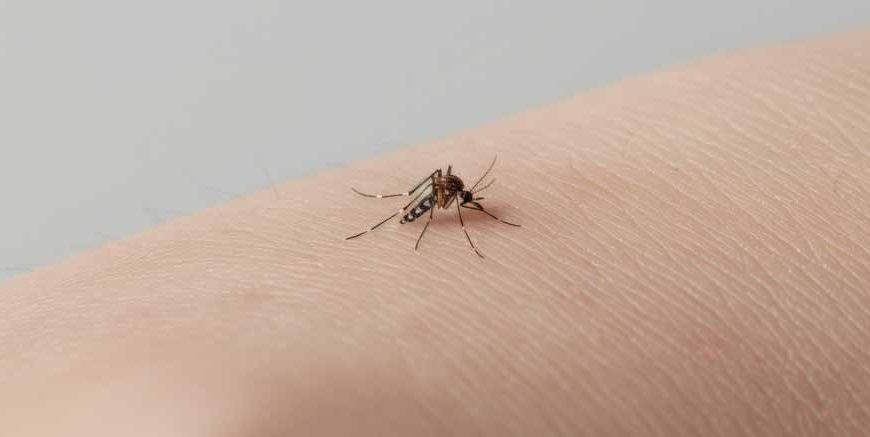Mumbai is home to Ramesh. Despite applying regular mosquito repellents, he experienced unusually high mosquito bites during the monsoon season. It was a few weeks into the downpour that his teenage daughter acquired a high fever, severe headaches, and joint problems. After seeing the doctor and having her blood tested, she was diagnosed with dengue. This event has jolted his family, and now they know how important it is to take precautions seriously…this could have happened to anyone, which shows that there should be more awareness about dengue. People should take action against it if necessary.
In India, monsoons provide relief from the searing summer heat. This rain recharges our bodies, but it also serves as a breeding ground for mosquitoes, particularly the Aedes aegypti mosquito, which carries the dengue virus in its body. Dengue fever, one of the most dangerous diseases spread between humans via virus bites from infected mosquitos, offers a significant health risk during these months. Let us discuss some effective methods to protect ourselves from dengue, like prevention measures against different forms of dengue and adopting healthy habits for our families’ overall wellness. Let us address key points like precautions for dengue, types of dengue, mosquito-borne diseases and safety from dengue.
Understanding Dengue Fever
Dengue is a viral infection caused by mosquitoes such as Aedes aegypti or, less commonly, Aedes albopictus, infected with one out of four closely related viruses labelled DENV (1-4). Normally, immune response acquired upon primary infection lasts lifelong only towards the infecting serotype; however, secondary infections may result in severe forms, i.e., DHF (dengue hemorrhagic fever) or DSS (dengue shock syndrome)
Knowing Symptoms
Knowing the signs and symptomatologies of dengue helps in early detection treatment intervention, too so it should be emphasised:
High fever
Severe headaches
Pain behind the eyes
Muscle joint pains
Nausea and vomiting
Rash on skin
In severe cases, manifestations may include bleeding from the gums or nose, persistent vomiting, and abdominal pain (which is more than usual), indicating the need for immediate medical attention.
Precautions for Dengue Control
During monsoons, to be safe against dengue, one needs to take following precautions:
- Eliminate Breeding Sites of Mosquitoes
- Use Repellents & Nets
- Install Door Window Screens
- Wear Protective Clothing
- Maintain Clean Surroundings: Cleanliness is next to godliness!
- Use Sprays Traps For Mosquito Control
Mosquitoes breed in stagnant water, so check empty standing containers regularly, including flower pots, coolers, birdbaths, and other discarded items that can collect rainwater. Also, storage tanks should be covered tightly to prevent an environment conducive to breeding mosquitoes.
Apply mosquito repellent creams/lotions onto exposed skin, especially during early morning hours when Aedes aegypti are most active, biting people outdoors, then later afternoon/evening hours prior to going outside again where there might still be some residual activity by these same mosquitos. Use bed nets while sleeping, particularly for infants and small children who cannot protect themselves from bites due to size limitations, immobility during sleep periods, etc.
Install mesh screens on doors and windows to prevent mosquitoes from entering houses. Ensure there are no holes or gaps through which they can pass unhindered.
Wear long-sleeved shirts, long pants, socks, and shoes when going out to reduce the amount of skin surface area available for mosquitoes to bite, thus lowering the risk of getting infected with dengue viruses transmitted through such bites disproportionately higher among those parts having higher concentration vascular network supply i.e. arms legs compared trunk region which has less number blood vessels per unit volume hence lower chance viral entry into the host through this route.
Keep surroundings clean, both inside and out. Dispose of garbage properly, store it in covered bins only, and avoid letting water accumulate around premises. For example, clogged drains attract mosquitos, breeding larvae that increase the risk of contracting dengue fever.
Use insecticide sprays or mosquito coils to kill adult mosquitoes present indoors at any given point in time. This should be done regularly, especially on evenings/nights when they come out biting people and then go back to hide in warm, dark places within houses where no light can penetrate, such as under beds, behind curtains, etc. Place sticky paper traps strategically around house corners, walls, table tops etc.; these will catch and kill those trying to escape after having fed on human blood meals, thereby reducing population density through attrition effect, thus lowering chances of getting infected with the dengue virus during subsequent encounters between females anopheles insects laying eggs near same areas where males frequent rest before seeking new mates so that more females produce viable offspring which continue cycle transmission year after year.
Those are the best precautions for dengue control.
Community Response to Dengue
Combating dengue fever requires a collective effort. Community initiatives can greatly reduce the risk of outbreaks, such as organising clean-up campaigns to get rid of mosquito breeding sites and enlightening people about the preventive measures against dengue fever. Fogging is done by local authorities who may periodically fog areas, which kills mosquitoes in their adult stage, and it has proved to be very effective when done regularly.
Traditional Measures And Natural Remedies
In addition to the common methods, natural remedies and traditional practices can also help in the prevention of dengue:
- Neem and Tulsi
- Lemongrass and Citronella
- Early Diagnosis And Timely Treatment
- Vaccination As A Preventive Measure
- Creating Awareness And Educating Others
Both neem and tulsi are known for their property as natural mosquito repellents. Burning neem leaves or using neem oil diffusers helps keep mosquitos at bay, while planting tulsi around houses reduces their presence.
Lemongrass and citronella oils also act as good natural repellants; they can be used in candles, sprays, or diffusers to drive mosquitoes away.
Prompt treatment and early diagnosis could save lives when dealing with dengue fever. Should any member of your family experience symptoms associated with this disease, kindly seek medical care immediately. Blood tests can detect the presence of the virus, hence guiding appropriate medical intervention. Rest, hydration, and pain relief are key components for managing dengue, while severe cases might need hospitalisation so that complications can be handled effectively.
Though there is no specific antiviral treatment for dengue; vaccines offer some level of protection against it.The Dengvaxia vaccine protects from all four types of dengue virus but its use is restricted based on certain conditions like prior infection with dengue.Consult a doctor if you want more information concerning vaccination suitability for both yourself and family members.
Dengue is one of the worst mosquito-borne diseases. Knowledge is power when it comes to fighting dengue. Share safety tips on avoiding this disease with friends, relatives, and neighbours. Encourage them to be more cautious and participate in activities aimed at reducing mosquito breeding points within communities. Together, we can make our environment safer for everyone.
Conclusion
Safety from dengue is one of the key concerns around the monsoon season. Preventing dengue during rainy seasons requires being proactive by taking necessary precautions. These include destroying breeding places of mosquitoes, using repellants, wearing protective clothes, and keeping clean so as not to attract these insects, which would greatly reduce infection. Community involvement is equally important in preventing outbreaks of this nature since they have a larger impact than individual efforts alone. Early detection combined with timely management may help better control the condition; thus, people need to stay updated about such diseases throughout the year. Stay safe while enjoying the rains without worrying about getting dengue fever.
Parents should consider enrolling their little ones in EuroKids, where we have put safety first during this monsoon season for your child’s growth and development. We understand that every parent wants what is best for his or her kid; hence, our facilities are designed keeping in mind all aspects that contribute towards ensuring good health among children, which gives peace of mind, especially at times like these when there is an increased risk of contracting diseases such as dengue fever due to heavy rainfall.
















